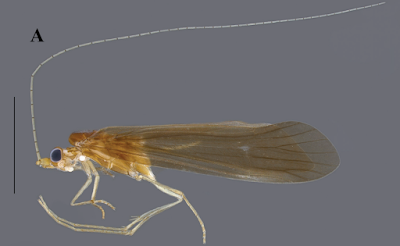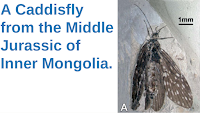Caddisflies, Trichoptera, are a widespread and numerous (over 12 000 described species) group of Insects closely related to the Lepidoptera (Butterflies and Moths). Like Butterflies and Moths, Caddisflies undergo a complete metamorphosis upon reaching maturity, with a long-lived caterpillar-like larvae, and a shorter-lived flying adult stages (which typically lives one-to-two weeks). However, unlike the larvae of Butterflies and Moths, Caddisfly larvae are entirely aquatic, with only the winged adults emerging above the water surface. Most larval Caddisfly inhabit cases which they make out of silk, which some species are noted for covering with small stones, pieces of plant matter, shells or other matter they find in their environment. The larvae may be herbivorous or carnivorous, adult Caddisfly generally do not eat at all. Long-horned Caddisflies, Leptoceridae, are the second most numerous group of Caddisflies, with about 2200 described species grouped into four subfamilies the Grumichellinae, the Leptocerinae, the Leptorussinae, and the Triplectidinae. The tropical Southern Hemisphere genus Notalina is placed within the Subfamily Triplectidinae, and is itself divided into two subgenera, Notalina (Notalina), which is found in Austalasia and Notalina (Neonotalina) from South America.
In a paper published in the journal ZooKeys on 11 July 2022, Erica Silva Pereira of the Programa de Iniciação Científica and the Divisão do Curso em Entomologia at the Instituto Nacional de Pesquisas da Amazônia, Ian Oliveira of the Laboratório de Entomologia Aquática at the UniversidadeFederal da Bahia, Gleison Robson Desidério, also of the Divisão do Curso em Entomologia at the Instituto Nacional de Pesquisas da Amazônia, Adolfo Calor, also of the Laboratório de Entomologia Aquática at the Universidade Federal da Bahia, and Neusa Hamada, once again of the Divisão do Curso em Entomologia at the Instituto Nacional de Pesquisas da Amazônia, describe a new species of Notalina (Neonotalina) from Brazil.
The new species is described from specimens collected using Malaise traps close to rivers in the Cerrado (Brazilian savanna) biome in Brazil's Federal District, and Tocatins and Bahia states. It is named Notalina (Neonotalina) ralphi, in honour of Ralph Holzenthal of the University of Minnesota, for his work on Neotropical Caddisflies and support for new entomologists.
See also...





